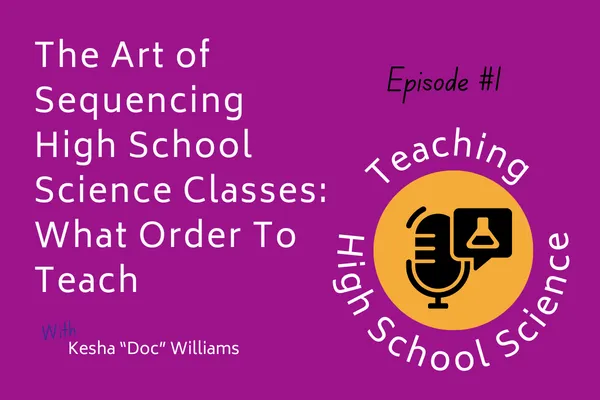On The Pod
I want to hear from you!
Join the dialog and share your comments, experiences, and questions by visiting the Facebook link in each Podcast!

E1 The Art of Sequencing High School Science Classes: What Order To Teach
In this episode of Teaching High School Science, we delve into the perennial question: how should high school science be sequenced? As your host, I, Doc, a former biochemist turned high school science teacher and private tutor, guide you through the complexities of structuring a science curriculum tailored to your student's goals and interests.
Firstly, it's crucial to recognize that there's no one-size-fits-all answer.
The progression you choose should align with your student's ambitions and any college requirements. Conversations with your student and research into colleges' expectations are key.
Typically, a standard progression starts with biology in ninth grade, followed by chemistry or physical science in tenth grade, and a rigorous lab-based science as an elective in eleventh grade. However, some states may vary this sequence.
For students eyeing STEM careers, it's advisable to aim for four years of science.
This might entail starting with biology and then advancing to honors or AP courses based on interests and college aspirations. Participation in AP programs is possible for homeschoolers, too, with guidance available through the College Board.
Mathematics is intertwined with science education, with algebra preceding chemistry and trigonometry before physics. A solid foundation in math is essential for grasping scientific concepts effectively.
Alternative progressions exist, accommodating diverse student needs and interests.
Some may accelerate by taking biology in eighth grade, while others might prioritize foundational math skills before diving into science courses.
Ultimately, the path chosen should align with state requirements, future plans, and any adjustments in the student's career trajectory. Flexibility and adaptability are crucial.
Join me on Teaching High School Science as we navigate through the intricacies of high school science education. Subscribe for regular insights and tips on making science education a journey of exploration and achievement. Remember, curiosity leads to endless opportunities.
Leave your ideas, comments, or experiences in this podcast's FaceBook discussion by visiting the post HERE!
All Rights Reserved 2023 - (C) TheScienceMentor.com -TM | Terms & Conditions | Privacy Policy | Disclaimers
